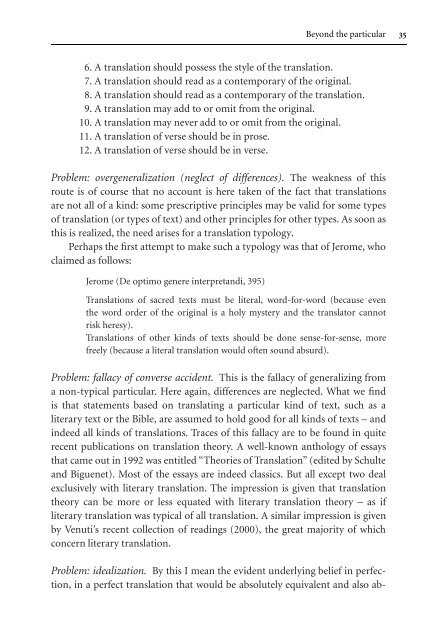Translation Universals.pdf - ymerleksi - home
Translation Universals.pdf - ymerleksi - home
Translation Universals.pdf - ymerleksi - home
Create successful ePaper yourself
Turn your PDF publications into a flip-book with our unique Google optimized e-Paper software.
Beyond the particular 35<br />
6. A translation should possess the style of the translation.<br />
7. A translation should read as a contemporary of the original.<br />
8. A translation should read as a contemporary of the translation.<br />
9. A translation may add to or omit from the original.<br />
10.Atranslationmayneveraddtooromitfromtheoriginal.<br />
11. A translation of verse should be in prose.<br />
12. A translation of verse should be in verse.<br />
Problem: overgeneralization (neglect of differences). The weakness of this<br />
routeisofcoursethatnoaccountisheretakenofthefactthattranslations<br />
arenotallofakind:someprescriptiveprinciplesmaybevalidforsometypes<br />
of translation (or types of text) and other principles for other types. As soon as<br />
this is realized, the need arises for a translation typology.<br />
Perhaps the first attempt to make such a typology was that of Jerome, who<br />
claimed as follows:<br />
Jerome (De optimo genere interpretandi, 395)<br />
<strong>Translation</strong>s of sacred texts must be literal, word-for-word (because even<br />
the word order of the original is a holy mystery and the translator cannot<br />
risk heresy).<br />
<strong>Translation</strong>s of other kinds of texts should be done sense-for-sense, more<br />
freely (because a literal translation would often sound absurd).<br />
Problem: fallacy of converse accident. This is the fallacy of generalizing from<br />
a non-typical particular. Here again, differences are neglected. What we find<br />
is that statements based on translating a particular kind of text, such as a<br />
literary text or the Bible, are assumed to hold good for all kinds of texts – and<br />
indeed all kinds of translations. Traces of this fallacy are to be found in quite<br />
recent publications on translation theory. A well-known anthology of essays<br />
that came out in 1992 was entitled “Theories of <strong>Translation</strong>” (edited by Schulte<br />
and Biguenet). Most of the essays are indeed classics. But all except two deal<br />
exclusively with literary translation. The impression is given that translation<br />
theory can be more or less equated with literary translation theory – as if<br />
literary translation was typical of all translation. A similar impression is given<br />
by Venuti’s recent collection of readings (2000), the great majority of which<br />
concern literary translation.<br />
Problem: idealization. By this I mean the evident underlying belief in perfection,<br />
in a perfect translation that would be absolutely equivalent and also ab-
















